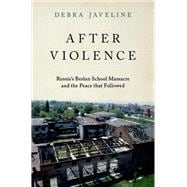A novel analysis of the aftermath of the most appalling terrorist act in Russian history, the seizure of a school and the violent deaths of hundreds of hostages, and insights into why it triggered unprecedented peaceful political activism instead of the widely predicted retaliatory ethnic violence.
Starting on September 1, 2004, and ending 53 hours later, Russia experienced its most appalling act of terrorism in history, the seizure of School No. 1 in Beslan, North Ossetia. Approximately 1,200 children, parents, and teachers were taken hostage. Over 330 were killed, hundreds more seriously wounded, and all severely traumatized. When does such violence fuel greater acceptance of retaliatory violence, and when does violence fuel nonviolent participation in politics?
In After Violence, Debra Javeline addresses this crucial question by exploring the motivations behind individual responses to violence. The mass hostage taking was widely predicted to provoke a spiral of retaliatory ethnic violence in the North Caucasus, where the act of terror was embedded in a larger context of ongoing conflict between Ossetians, Ingush, and Chechens. Politicians, journalists, victims, and other local residents asserted that vengeance would come. Instead, the hostage taking triggered unprecedented peaceful political activism on a scale seen nowhere else in Russia. Beslan activists challenged authorities, endured official harassment, and won a historic victory against the Russian state in the European Court of Human Rights. Using systematic surveys of 1,098 victims (82%) and 2,043 nearby residents, in-depth focus groups, journalistic accounts, investigative reports, NGO reports, and prior scholarly research, Javeline provides insights into this unexpected but favorable outcome.
The first book to analyze the aftermath of large-scale violence with evidence from almost all direct victims, After Violence offers novel findings about the influence of anger, prejudice, alienation, efficacy, and other variables on post-violence behavior.








